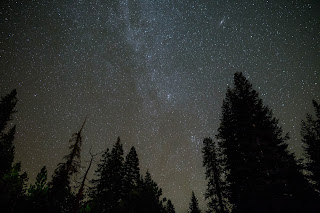Over the last couple years I was able to visit Sierra Nevada's mountains in California. Even if one is not remotely interested in the night sky and the insane amounts of days of excellent seeing conditions, I would still not hesitate and recommend it to anyone. The granite peaks, the fresh air, the crystal clear lakes, the remoteness of wilderness is very much worth of a visit. However, if one is coming from east coast where dark skies is such a rarity, the Sierra Nevada night sky becomes an exotic that I wish anyone could experience and see for themselves.
Next two images were taken at Sequoia National Park at more than 7,000 ft of altitude. One of the first things you notice is that stars don't flicker much. At high altitude, so much of dense air is beneath you and stars appear brighter and steadier. It was so dark and so steady that it did seem that you are on a rock in space and you are in this galaxy that you see all around you from horizon to horizon.
In this image I was 20 min away from Yosemite National Park, at the Mono Lake. During that trip, it was (shocking!) raining during most of the week and I only had few hours to take pics of Milky Way from dark location. I got up at 2am in Lee Vining and went to the location I visited a day before, which is Tufa formations at Mono Lake. It was me, coupe other photographers from LA area and a couple of screaming coyotes.
If one loves nature and night skies, you can't go wrong if you visit Sierra Nevada range. There is nothing like that available on the east coast.
Some of the equipment I used: Canon 6D. Rokinon 24 mm 1.4 lens. Shot at high ISO, around 5000. I stopped down lens at F2.0. Regular tripod (make sure it is very steady, use weights if necessary).
Vlad
Vlad



No comments:
Post a Comment